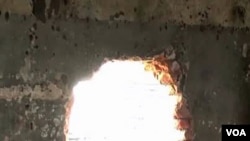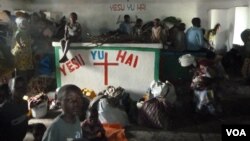GOMA —
As M23 rebels begin to withdraw from the city of Goma in the eastern Democratic Republic of Congo, there are fears their exit will leave behind a security vacuum.
Just over a week after taking control of Goma, the M23 rebels are pulling out.
But even though the fighting has ended, and the dead have been buried, insecurity is expected to remain a challenge.
When M23 took control of Goma, DRC security forces fled, including the guards at a men's prison.
In the chaos that followed, more than 1,500 men, criminals, escaped from the prison, many of them through a hole in the wall.
With the rebels gone, it's up to the Congolese army to now restore order.
But the army, known as the FARDC, also fled the city as M23 approached, leaving behind soldiers' wives and children.
Sipha, whose husband is in the army, says she has not heard from him since the troops fled the city.
“I don't know if I'll see my husband again. For now, I'm living like a widow," she said.
Thousands of people displaced by the conflict have been left vulnerable. Many at the Murunga IDP camp outside Goma have had to relocate two or three times in the past year. They worry that conflict could break out again.
Sirie Nafanjala is one of those starting over. He's weatherproofing his new home. His last home was ransacked by retreating FARDC soldiers.
“Life was hard here before, but then later some came in and started helping us, and we started living nicely. But then the war came, and things changed again. So that's how we are living here," he said.
Aid workers are concerned that if the conflict returns, conditions could become even worse and access to those in need impossible.
“We're able to provide basic medical care, but, on a longer term basis, this isn't sustainable, and we're very concerned about the situation for people," said
Grace Tang, who is with the medical aid group Medecins Sans Frontieres, or Doctors Without Borders.
While M23's future plans are uncertain, many hope their exit will bring a moment of peace for those tired of war.
Just over a week after taking control of Goma, the M23 rebels are pulling out.
But even though the fighting has ended, and the dead have been buried, insecurity is expected to remain a challenge.
When M23 took control of Goma, DRC security forces fled, including the guards at a men's prison.
In the chaos that followed, more than 1,500 men, criminals, escaped from the prison, many of them through a hole in the wall.
With the rebels gone, it's up to the Congolese army to now restore order.
But the army, known as the FARDC, also fled the city as M23 approached, leaving behind soldiers' wives and children.
Sipha, whose husband is in the army, says she has not heard from him since the troops fled the city.
“I don't know if I'll see my husband again. For now, I'm living like a widow," she said.
Thousands of people displaced by the conflict have been left vulnerable. Many at the Murunga IDP camp outside Goma have had to relocate two or three times in the past year. They worry that conflict could break out again.
Sirie Nafanjala is one of those starting over. He's weatherproofing his new home. His last home was ransacked by retreating FARDC soldiers.
“Life was hard here before, but then later some came in and started helping us, and we started living nicely. But then the war came, and things changed again. So that's how we are living here," he said.
Aid workers are concerned that if the conflict returns, conditions could become even worse and access to those in need impossible.
“We're able to provide basic medical care, but, on a longer term basis, this isn't sustainable, and we're very concerned about the situation for people," said
Grace Tang, who is with the medical aid group Medecins Sans Frontieres, or Doctors Without Borders.
While M23's future plans are uncertain, many hope their exit will bring a moment of peace for those tired of war.





